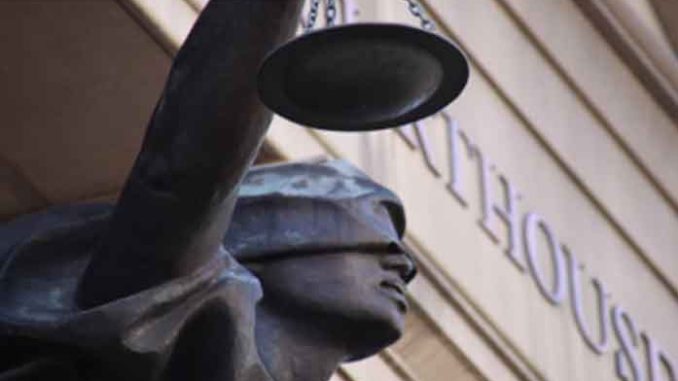
While Arizona’s court system and law enforcement agencies try to control the spread of COVID-19, county and court officials are ensuring procedures are in place to address any potential local public health orders for involuntary or forced quarantines.
Chief Justice Robert Brutinel of the Arizona Supreme Court has signed off on an administrative order which assigns at least one superior court judge in every county to hear cases involving quarantine orders against those who test positive for communicable and infectious diseases.
“Judicial review of these orders and the opportunity for a person affected by an order to secure judicial review of these measures is required by law,” Brutinel noted in Administration Order 2020-41. “The courts must be prepared and available to respond effectively and expeditiously.”
Some counties refer to their assignee as a “pandemic” or “public health” judge. Such cases will be considered civil in nature and require the appointment of free legal counsel to protect the rights of the person targeted by the public health order.
To date there has been no public announcement of such legal action, but the Board of Supervisors in Pima and Cochise counties recently ensured appointment of counsel will be available if needed.
While court officials are preparing for “what if” scenarios, current efforts to prevent the spread of COVID-19 are already having real life implications in some courts. For instance, victims in criminal cases assigned to the Tucson City Court can’t get through to court staff.
Those who call the phone number shown on the court’s website for victims receive a recorded message that there will be no court hearings before May 18 because “the building is closed.” The message states all parties will be notified of when they need to appear.
The call then disconnects, leaving crime victims no option for speaking with a real person or leaving a message.
And in Pima County, some county and court employees have questioned a memo County Administrator Chuck Huckelberry sent to Presiding Judge Kyle Bryson, the county’s top administrative judge.
In the memo, Huckelberry says all county judges need to know he wants to be notified if a representative of County Attorney Barbara LaWall’s office or the county’s Public Defense Services department fails to appear for a hearing. The memo was copied to LaWall and to Dean Brault, who as director of PDS oversees the county’s various county-employed and contracted attorneys.
“Telecommuting does not relieve the employee of their obligation to service the Court and their clients,” Huckelberry wrote. “If the Court is inconvenienced or delayed in any manner due to failure of appropriate County Attorney or PDS staff to appear, I intend to pursue appropriate action through the respective appointing authority.”
No such warning is necessary in Cochise County, according to County Attorney Brian McIntyre, who says local orders that mandate postponing many types of hearings, limiting public access to the county’s 10 courthouses, and relying on video conferencing when practical have gone smoothly.
“Thus far we have had a very cooperative relationship with all of the players in the criminal justice system,” McIntyre said. “Court coverage is working well, whether in person, telephonic or through the video system. We continue to collaborate here on ways to make the system continue functioning while still maintaining the safety of the public, the clients, and our employees.”
Meanwhile, the sheriffs of Cochise, Pima, and Santa Cruz counties continue to find ways to provide services while encouraging social distancing.
In Pima County, detention officials with the sheriff’s department are now monitoring the health of all new inmates coming into the jail and have implemented a two-week isolation period before those inmates are allowed into general population. Nearly 1,600 inmates are in Pima County’s jail system, according to recent reports.
Some of those inmates have actually been sentenced to prison but must remain in the Pima County jail due to a 21-day transfer hold initiated March 30 by the Arizona Department of Corrections (ADC). The same is true in Cochise County, where detention officials are billing ADC about $60 per day per inmate who should be in ADC custody but must remain in the county jail in Bisbee due to the transfer hold.

Cochise County Sheriff Mark Dannels has taken a similar step to limit the spread of COVID-19 by ordering potentially ill inmates to be housed at a satellite county jail in Sierra Vista just one block from the county’s largest hospital.
“Our Sierra Vista satellite detention facility provides us the opportunity to isolate incoming or current inmates that show medical signs of COVID-19 or illness,” Dannels told Arizona Daily Independent. “To date, we’ve housed two inmates there with signs or symptoms. Both were eventually medically cleared.”
It’s an example, says Dannels, of “healthy smart practices” that detention facilities need to implement.
“Having this isolation option provided another protected layer in our efforts to keep our two other detention facilities healthy and operationally sound,” he said.
Like many sheriffs, Santa Cruz County Sheriff Tony Estrada has also initiated COVID-19 abatement practices that apply to his patrol and administrative personnel.
Deputies are now accepting many police reports by phone rather than in-person, while fingerprinting for employment clearance cards has been temporarily suspended to limit traffic in the building. Record requests are also being handled electronically or by mail to help reduce the amount of contact staff has with the public.
Estrada has even established a special procedure for working with some sex offenders who are required to report their arrival into the county, or simple address changes, within a specific amount of time.
“Mandatory registration will be handled over the phone or by email,” according to a SCCSO memo. “If there are changes which require a signature, initials, or fingerprints we will make arrangements to meet with you at a designated location in order to meet the registration requirements of the Arizona Revised Statutes.”
